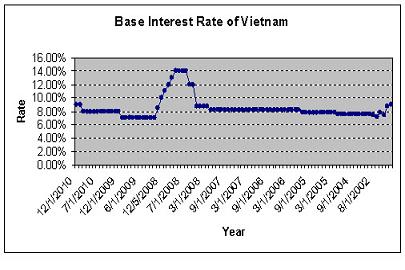Base interest rate (BIR) of State Bank of Vietnam
Law on the State Bank of Viet Nam (SBV) provides that SBV may announces a basic interest rate (BIR) and other types of interest rates in order to administer national monetary policies and to combat the practise of lending at excessive interest rates
Post date: 23-01-2014
38,247 view(s)
Law on the State Bank of Viet Nam (SBV) provides that SBV may announces a basic interest rate (BIR) and other types of interest rates in order to administer national monetary policies and to combat the practise of lending at excessive interest rates. To implement this authority, the SBV issued Circular 16/2008/TT-NHNN dated 16 May 2008 (Circular 16) stipulating that SBV would announce a base interest rate for Vietnam Dong on a monthly basis and that credit institutions would decide their lending interest rate, provided that the rate does not exceed 150% of the base interest rate. Then, the SBV announced a VND base interest rate monthly.

Basic interest rate of Vietnam by year
However, the SBV issued Circular 12/2010/TT-NHNN dated 14 April 2010 (Circular 12) repealing Circular 16 and permitting credit institutions to freely negotiate lending interest rate with borrowers, rather than being subject to the cap of 150% of the base interest rate. Notwithstanding Circuarl 12, the SBV continued to announce a base interest rate for VND on a monthly basis until the end of 2010 in order to combat the practise of lending at excessive interest rate and be applicable to the civil transactions. The last announcement of a base interest rate was made by the SBV under its Official Letter 2868 dated 29 Novemeber 2010 (OL 2868) under which the base interest rate is 9% per year effective from 1 Dec 2010.
Although SBV has ceased announcement of the base interest rate since the end of 2010, references to base interest rates have been widely used in various laws and contracts. Indeed, the Civil Code 2005, effective from 1 Jan 2006, referes to the application of the base interest rate in several of its articles, as summarized below:
|
Article |
Heading |
Contents |
|
305.2 |
Late performance of civil obligations |
Where the payment of money by obligor is late, the obligor must pay interest on the late amount for the period of delay in payment at the BASE INTEREST RATE at the time of payment, unless otherwise agreed or otherwise provided by law. |
|
436.2 |
Liability for handing over objects in incomplete sets |
In cases where the purchaser has made payment but not yet received the object due to the hand-over of an incomplete set, purchaser shall be paid interests on the paid amount at the BASE INTEREST RATE and demand that the seller compensate for damage due to the hand-over of the incomplete set, starting from the time the contract must be performed to the time the complete set is handed over. |
|
474.4 |
Borrowers’ obligation to repay debts |
In case of an interest-free loan, if the borrower fails to repay or has not repaid fully the debt when it becomes due, he/she must pay the interest on the amount of overdue debt at the BASE INTEREST RATE corresponding to the duration of late payment at the time of repayment of the debt, if so agreed upon. |
|
474.5 |
Borrowers’ obligation to repay debts |
In case of a loan with interest, if the borrower fails to repay or has not repaid fully the debt, he/she must pay the interest on the principal and the interest thereon at the BASE INTEREST RATE corresponding to the borrowing term at the time of repayment of the debt. |
|
476.1 |
Interest rate of loan |
The lending interest rate shall be agreed upon by the parties, but must not exceed 150% of the BASE INTEREST RATE for loans of the corresponding type. |
|
476.2 |
Interest rate of loan |
In cases where the parties have agreed on the payment of interest for a loan but have not clearly determined an interest rate or have a dispute over an interest rate, the BASE INTEREST RATE corresponding to the borrowing term at the time of repayment of the debt shall be applied. |
|
576.2 |
Payment of insurance indemmity |
In cases where the issurer delays the payment of insurance indemnity, he/she/it must also pay the interest on the late paid amount at the BASE INTEREST RATE at the time of payment of insurance indemnity corresponding to the duration of the delayed payment. |
|
709 |
Late payment of land rent |
When the lessee delays in paying the rent for the lease of land use rights as agreed upon, the lessor may grant an extension; if such extension has expired and the lessee fails to fulfill his/her obligations, the lessor shall be entitled to unilaterally terminate the performance of the contract and request the lessee to return the land. The lessor shall be entitled to request the lessee to make the full payment for the time during which the land use rights were leased, including the interest on the amount of delayed payment at the BASE INTEREST RATE corresponding to the period of delayed payment at the time of payment. |
Notably, Article 476.1 of Civil Codes stipulates that the interest rate for lending money may not exceed 150% of base interest rate. As the current base interest rate is deemed by OL 2686 to be 9% per year, the maximum interest rate for loans between companies and/or individuals is 13.5% per year, however, this cap in Civil Codes does not apply to loans provided by credit institutions and therefore the current market rates for lending by credit institutions are in rage of 13-17% higher than the cap rate.
Another anomaly is that Article 306 of the Commercial Law, effective 1 Jan 2006, provides that an aggrieved party may demand interest on a delay payment for goods or services for the delayed period at the "average interest rate applicable to overdue debts in the market" at the time of such payment, unless otherwise agreed by the parties or otherwise provided by law. The "average interest rate applicable to overdue debts in the market" may be equivalent to the banks” interest rates for overdue debts, which are in range of 18-20% per year (i.e. 150% of lending interest rate).
In accordance with Article 305.2 of Civil Codes, the aggrieved party is entitled to receive interest rate for delay payment at base interest rate (i.e. 9% per year). Therefore, the determination of whether the contract is governed by Commercial Law or Civil Codes is very important in these circumstances.
In addition to the Civil Codes, the regulation on corporate income tax also refer to the base interest rate. Under Article C.IV.2.14 of Circular 130 of Finance Ministry dated 26 December 2008 (as amended on 10 February 2011) on Corporate Income Tax, in the case of loans for production and business purposes borrowed from persons other than credit institutions, or economic organizations, any interest rate exceeding 150% of the base interest rate may not be considered a deductable expenses of the borrowers against its corporate income tax. This cap was possibly derived from Article 476.1 of Civil Codes.
List of base interest rate by years (Download)
Lawyervn.net














Send your comment